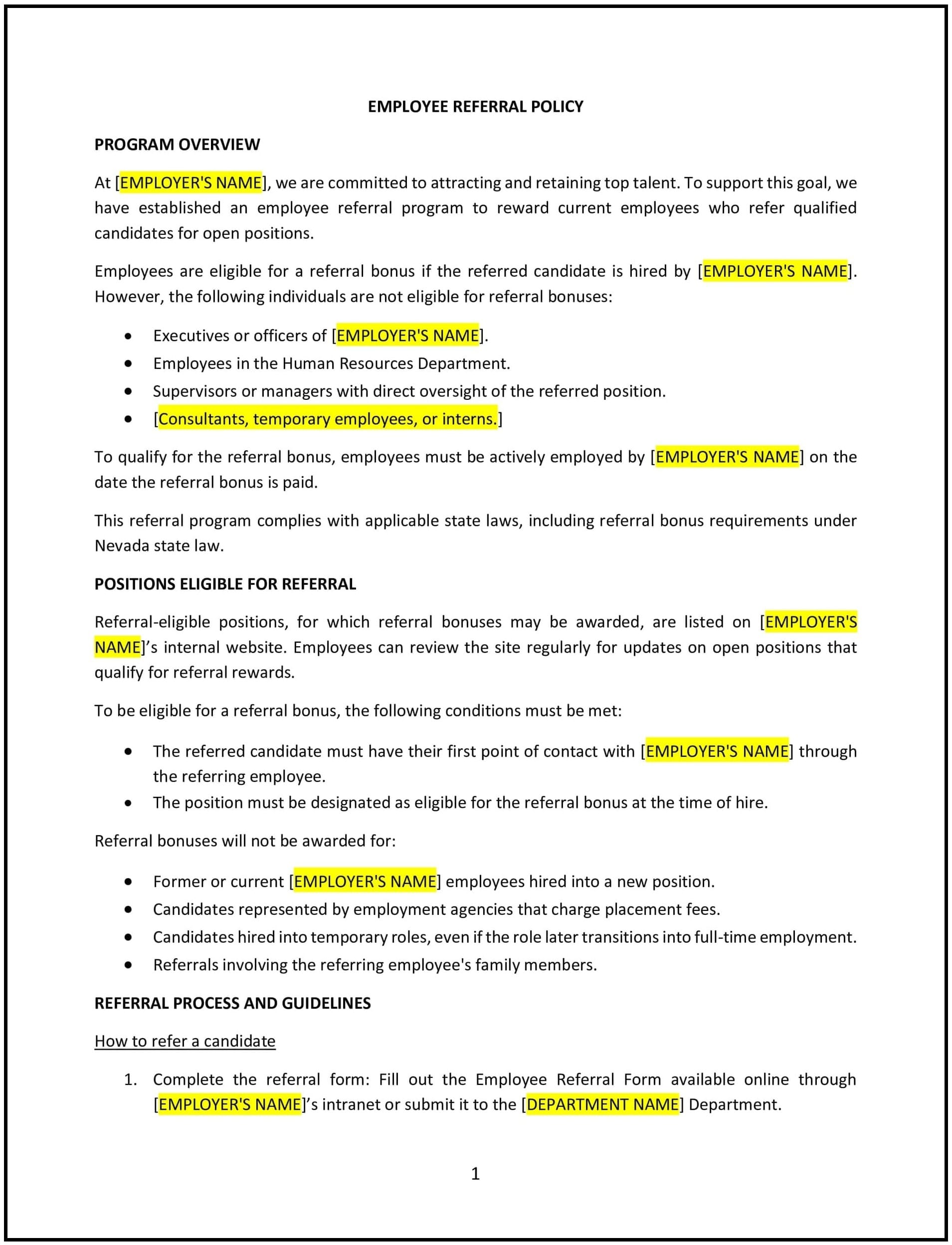Got contracts to review? While you're here for policies, let Cobrief make contract review effortless—start your free review now.

Customize this template for free
Employee referral policy (Nevada)
This employee referral policy is designed to help Nevada businesses encourage current employees to refer qualified candidates for open positions. The policy outlines the guidelines for referring candidates, the rewards or incentives for successful referrals, and the process for submitting referrals.
By adopting this policy, businesses can tap into their employees’ networks to find top talent, reduce recruiting costs, and foster a collaborative, engaging workplace culture.
How to use this employee referral policy (Nevada)
- Define referral eligibility: Specify who is eligible to participate in the referral program, typically employees who are currently employed full-time or part-time at the company. Clarify any exceptions, such as managers or HR personnel being ineligible to refer candidates for certain roles.
- Set criteria for referrals: Outline the qualifications and criteria for a successful referral, such as experience, skills, and job fit. Specify whether referrals should be for specific job openings or if they can be general referrals for any open positions.
- Describe the referral process: Explain how employees should submit referrals, including the required format (e.g., through an online portal, email, or referral form). Include instructions on providing candidate resumes, contact information, and any relevant details.
- Outline rewards and incentives: Clearly define the rewards or incentives for successful referrals, such as cash bonuses, gift cards, or other non-monetary benefits. Specify the conditions under which employees will receive their reward (e.g., after the referred candidate is hired and completes a probationary period).
- Specify referral limits and restrictions: Set any limits on the number of referrals an employee can make, and specify any restrictions on who can be referred (e.g., family members, former employees, etc.).
- Clarify the selection process: Emphasize that all referrals will be considered based on the company’s recruitment needs, and clarify that submitting a referral does not guarantee a job offer. Provide transparency regarding the selection process for referred candidates.
- Encourage continuous participation: Regularly communicate the referral program to employees, encouraging them to refer high-quality candidates and reminding them of the program’s benefits.
Benefits of using this employee referral policy (Nevada)
This policy provides several key benefits for Nevada businesses:
- Attracts top talent: By leveraging the networks of current employees, businesses can attract qualified candidates who are more likely to align with the company’s culture and values.
- Reduces recruiting costs: Employee referrals often reduce the need for external recruiting services, which can be expensive, and can lead to faster hiring processes.
- Improves employee engagement: Referral programs encourage employees to become active participants in the hiring process, fostering a sense of ownership and involvement in the company’s success.
- Enhances employee retention: Candidates hired through employee referrals are often a better fit for the company culture, leading to higher job satisfaction and retention rates.
- Strengthens company culture: By encouraging employees to refer candidates who share similar values, businesses can strengthen their culture and create a more cohesive team.
Tips for using this employee referral policy (Nevada)
- Communicate the policy clearly: Ensure that all employees are aware of the referral policy and understand how to participate. Use company meetings, newsletters, and employee handbooks to highlight the program.
- Track and reward referrals: Implement a system to track referral submissions and ensure that employees receive their rewards promptly after a successful hire.
- Encourage participation: Regularly remind employees of the referral program and provide updates on current job openings, especially those that might be a good fit for candidates within their networks.
- Maintain fairness: Ensure that the referral process is fair and unbiased by considering all applicants, whether referred by an employee or not, based on their qualifications and fit for the role.
- Monitor program effectiveness: Regularly evaluate the success of the referral program, including metrics such as the number of referrals, the quality of hired candidates, and the retention rate of referred employees.